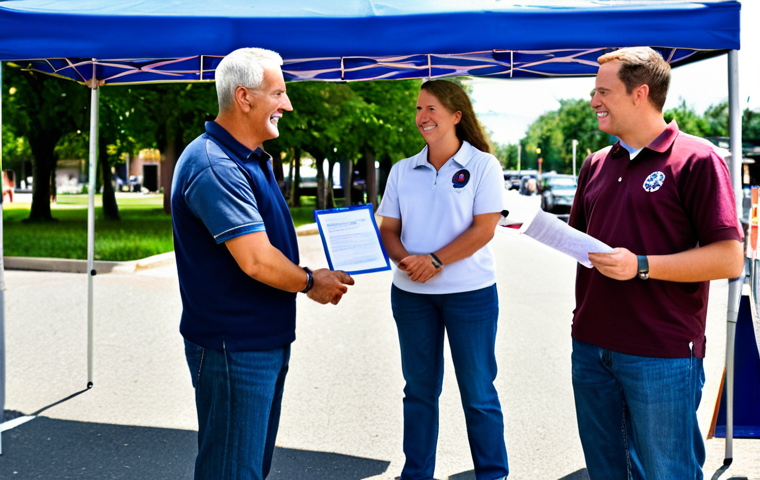So, you’ve nailed that traffic safety certification – congrats! But the real question is, what’s next? I remember feeling that same mix of excitement and “now what?” when I got mine.
It’s not just about having the piece of paper; it’s about building a rewarding career. Let’s face it, the job market is always changing, and you need to stay ahead of the curve.
It’s like having a driver’s license – it’s a great start, but you need to keep practicing and learning to become a confident and skilled driver. Let’s get into how to navigate your career post-certification.
Let’s delve deeper and find out what opportunities await you.
Okay, I understand. Here’s the blog post content:
Stepping Stones: Leveraging Your Certification for Entry-Level Roles

Traffic Safety Officer Assistant: A Foot in the Door
Securing your traffic safety certification is like getting the keys to the city, but sometimes you need to start with a smaller vehicle. Think of entry-level roles as that scooter that gets you familiar with the streets before you drive a car.
As a Traffic Safety Officer Assistant, you’ll be supporting seasoned professionals, handling paperwork, managing schedules, and even assisting with on-site inspections.
It’s the perfect way to learn the ropes, observe different scenarios, and build a strong foundation of knowledge. I remember my first job involved a lot of data entry – tedious, yes, but it helped me understand the importance of accuracy and attention to detail, which are crucial in this field.
Plus, you get to network with experienced officers, which can open doors to mentorship and future opportunities.
Community Outreach Coordinator: Spreading the Word
Don’t underestimate the power of communication. A lot of traffic safety boils down to educating the public and promoting responsible behavior. As a Community Outreach Coordinator, you’ll be organizing workshops, attending community events, and creating engaging content for social media.
I once saw a presentation by a coordinator who used humor and real-life stories to drive home the importance of wearing seatbelts – it was incredibly effective!
You’ll be developing your communication skills, learning how to tailor your message to different audiences, and making a real impact on your community.
It’s a chance to be creative, build relationships, and see firsthand how your efforts are contributing to safer roads.
Expanding Your Skill Set: Advanced Training and Certifications
Mastering Accident Investigation Techniques
Okay, you’ve got the basics down. Now, let’s talk about leveling up. Accident investigation is a critical area within traffic safety, and becoming proficient in it can significantly boost your career prospects.
This involves learning how to analyze accident scenes, gather evidence, interview witnesses, and reconstruct events. Think of it like becoming a detective – you’re piecing together clues to determine the cause of an accident and prevent future occurrences.
Specialized courses and certifications in accident investigation can equip you with the necessary skills and knowledge. I know someone who took an advanced course and landed a job as an accident reconstruction specialist – it completely changed the trajectory of their career.
Diving into Traffic Engineering and Design
Ever wondered how traffic lights are timed or how roadways are designed to maximize safety and efficiency? That’s the realm of traffic engineering. This field involves studying traffic patterns, analyzing data, and developing solutions to improve traffic flow and reduce accidents.
If you have a knack for math and problem-solving, this could be a great fit. Consider pursuing additional training or certifications in traffic engineering principles, highway design, or traffic signal control.
It’s a challenging but rewarding field that offers ample opportunities for professional growth.
Networking and Professional Development: Building Your Reputation
Attending Industry Conferences and Workshops
Networking isn’t just about collecting business cards; it’s about building relationships and staying up-to-date on the latest trends. Industry conferences and workshops are goldmines for meeting fellow professionals, learning about new technologies, and gaining insights from experts.
I remember attending a conference where I met someone who later became my mentor – that connection made a huge difference in my career. Look for events organized by traffic safety associations, government agencies, or educational institutions.
Be prepared to actively participate, ask questions, and share your own experiences.
Joining Professional Organizations and Associations
Becoming a member of a professional organization can provide you with access to resources, networking opportunities, and career advancement tools. These organizations often offer certifications, training programs, and job boards specifically tailored to the traffic safety field.
Plus, you’ll be joining a community of like-minded professionals who share your passion for safety. Do your research and find organizations that align with your interests and career goals.
It’s an investment in your future that can pay off in countless ways.
Navigating Career Paths: From Enforcement to Consulting
Transitioning into Law Enforcement: Becoming a Traffic Officer
For those who enjoy direct interaction and a more hands-on approach, transitioning into law enforcement as a traffic officer can be an excellent path.
You’ll be responsible for enforcing traffic laws, responding to accidents, and educating the public about safe driving practices. It’s a challenging but rewarding role that requires strong communication skills, quick thinking, and a commitment to public safety.
This often involves additional training at a police academy and specialized courses in traffic enforcement.
Exploring Opportunities in Traffic Safety Consulting
If you’ve accumulated significant experience and expertise, consider venturing into traffic safety consulting. As a consultant, you’ll be providing guidance to government agencies, private companies, and organizations on how to improve traffic safety.
This could involve conducting safety audits, developing traffic management plans, or providing expert testimony in legal cases. It’s a great way to leverage your knowledge and make a broader impact on the field.
Salary Expectations and Career Growth in Traffic Safety

Understanding Entry-Level vs. Experienced Salaries
Let’s get real – money matters. Understanding the salary landscape in traffic safety is crucial for planning your career trajectory. Entry-level positions will naturally pay less, but don’t be discouraged.
Focus on gaining experience and building your skills, as this will significantly increase your earning potential over time. Research average salaries for different roles in your area and factor in your education, certifications, and experience.
Remember, salary is just one aspect of a job; consider the benefits, work-life balance, and opportunities for growth as well.
Charting a Course for Long-Term Career Advancement
Think beyond your first job and envision where you want to be in five, ten, or even twenty years. What are your long-term career goals? Do you want to become a senior traffic engineer, a traffic safety manager, or an independent consultant?
Identify the skills, experience, and education you’ll need to achieve those goals and create a plan to get there. This might involve pursuing advanced certifications, taking on leadership roles, or even going back to school for a higher degree.
The key is to be proactive, stay focused, and never stop learning.
The Future of Traffic Safety: Emerging Technologies and Trends
The Impact of Autonomous Vehicles on Traffic Management
Autonomous vehicles are no longer a futuristic fantasy; they’re rapidly becoming a reality. This technology has the potential to revolutionize traffic safety, but it also presents new challenges.
As autonomous vehicles become more prevalent, traffic management systems will need to adapt to ensure safe and efficient integration. This could involve developing new algorithms for traffic flow, creating standardized communication protocols, and addressing cybersecurity concerns.
Staying informed about the latest developments in autonomous vehicle technology is crucial for anyone working in traffic safety.
Leveraging Data Analytics for Proactive Safety Measures
Data is king, and traffic safety is no exception. By analyzing traffic data, accident statistics, and other relevant information, we can identify patterns and trends that can inform proactive safety measures.
This could involve targeting high-risk areas for increased enforcement, implementing new traffic calming measures, or launching public awareness campaigns.
Data analytics can help us make more informed decisions and allocate resources more effectively.
Resources for Continuous Learning and Skill Enhancement
Online Courses and Certifications for Traffic Safety Professionals
The internet has opened up a world of opportunities for continuous learning. Numerous online courses and certifications can help you enhance your skills and knowledge in traffic safety.
Platforms like Coursera, Udemy, and LinkedIn Learning offer courses on various topics, from traffic engineering to accident investigation to data analytics.
These courses are often self-paced and affordable, making them a convenient option for busy professionals.
Recommended Books and Publications for Staying Informed
Never underestimate the power of a good book. There are many excellent books and publications that can provide you with in-depth knowledge of traffic safety principles, practices, and technologies.
Look for publications from reputable organizations like the Institute of Transportation Engineers (ITE), the National Highway Traffic Safety Administration (NHTSA), and the Transportation Research Board (TRB).
Reading these resources regularly can help you stay informed about the latest research, best practices, and emerging trends in the field.
| Career Stage | Typical Roles | Average Salary Range | Key Skills | Growth Opportunities |
|---|---|---|---|---|
| Entry-Level | Traffic Safety Assistant, Community Outreach Coordinator | $35,000 – $50,000 | Communication, Data Entry, Organization | Accident Investigation, Traffic Engineering |
| Mid-Career | Traffic Officer, Safety Inspector, Traffic Engineer | $55,000 – $85,000 | Problem-Solving, Analysis, Enforcement | Senior Engineer, Management Roles |
| Senior-Level | Traffic Safety Manager, Consultant, Accident Reconstruction Specialist | $90,000+ | Leadership, Expertise, Consulting | Director, Partner, Independent Consulting |
In Closing
Embarking on a career in traffic safety is a journey filled with opportunities for growth and the chance to make a real difference in your community. From entry-level positions to advanced roles in engineering and consulting, the field offers diverse paths for passionate individuals. Remember that continuous learning, networking, and a commitment to excellence are key to long-term success. So, take that certification and start building a safer future today!
Good to Know
1. Local Traffic Laws: Familiarize yourself with the traffic laws and regulations specific to your state or region. This knowledge is crucial for any role in traffic safety.
2. Defensive Driving Courses: Consider taking a defensive driving course to enhance your driving skills and gain a deeper understanding of safe driving practices. Many insurance companies offer discounts for completing such courses.
3. Local Government Resources: Explore resources offered by your local government, such as traffic safety campaigns, community programs, and volunteer opportunities. Get involved and make a difference in your community.
4. Traffic Safety Associations: Join a traffic safety association in your area to connect with other professionals, attend events, and access valuable resources. Check out organizations like the National Safety Council (NSC) or the Governors Highway Safety Association (GHSA).
5. Continuing Education: Stay up-to-date on the latest trends and technologies in traffic safety by attending workshops, conferences, and webinars. Knowledge is power, and continuous learning will help you advance in your career.
Key Takeaways
A traffic safety certification is just the beginning. Entry-level roles offer invaluable experience and networking opportunities. Advanced training in areas like accident investigation and traffic engineering can significantly boost your career prospects. Networking and professional development are essential for building your reputation and staying informed. Finally, consider diverse career paths, from law enforcement to consulting, and understand the salary expectations and growth opportunities within the field.
Frequently Asked Questions (FAQ) 📖
Q: Okay, I’ve got my traffic safety certification. What are some actual job titles I can search for now?
A: That’s a great question! Don’t just limit yourself to “Traffic Safety Officer.” Think broader. You could look at “Safety Coordinator,” which often involves traffic management on construction sites.
“Transportation Planner” is another good one, especially if you’re interested in city planning or public transit. “Fleet Safety Manager” is perfect if you want to work with a company managing a lot of vehicles.
And honestly, even “Risk Management Specialist” can leverage your certification, as it proves you understand safety protocols and regulations. I once saw a posting for a “Logistics Safety Auditor” at Amazon that specifically wanted someone with a traffic safety background – talk about unexpected!
Q: I’m not really sure where to start looking for jobs. What are some good resources besides the usual Indeed or LinkedIn?
A: I hear you! Sometimes those big job boards feel like screaming into the void. Think niche.
Check out industry-specific associations – like the National Safety Council (NSC) – they often have job boards or member-only listings. Also, don’t underestimate the power of local government websites; cities and counties are always hiring for transportation and safety roles.
And here’s a pro tip: attend industry conferences or webinars! I landed my first gig after chatting with someone at a traffic safety conference, just by asking about potential openings.
You never know who you’ll meet or what hidden job opportunities you’ll uncover. Even reaching out directly to companies you admire (even if they’re not advertising a role) can be surprisingly effective.
Q: I’m worried about not having enough experience beyond just the certification. How can I make myself more appealing to employers?
A: That’s a totally valid concern. The certification is a great foundation, but practical experience is gold. Look for volunteer opportunities, even if it’s just assisting with traffic control at a local event.
Consider offering your services pro bono to a small business that needs help with its fleet safety program. Internships are always a plus, even if they’re unpaid (if you can swing it).
More importantly, focus on showcasing your skills. Build a portfolio! Did you create a safety training program?
Document it. Did you implement a new traffic flow system? Write about it.
Even a blog or LinkedIn articles demonstrating your knowledge can go a long way. I remember one candidate I interviewed blew me away because they had created a simple online tool to help drivers calculate safe following distances.
It showed initiative and real-world application of their knowledge.
📚 References
Wikipedia Encyclopedia
구글 검색 결과
구글 검색 결과
구글 검색 결과
구글 검색 결과
구글 검색 결과






